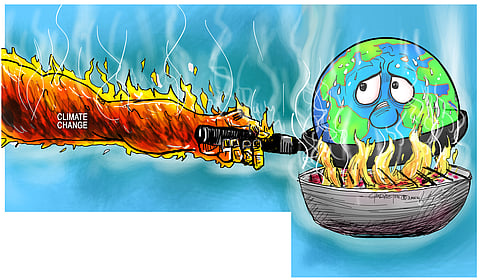
- NEWS
- the EDIT
- COMMENTARY
- BUSINESS
- LIFE
- SHOW
- ACTION
- GLOBAL GOALS
- SNAPS
- DYARYO TIRADA
- MORE

The Senate on Monday, 19 August 2024, passed on third and final reading Bill 2780 conferring juridical personal and legal entity on the Board of the Fund for Responding to Loss and Damage due to Climate Change, allowing it to buy land and (other) assets and enter into contracts in the country.
“Loss and damage” pertains to the United Nations’ description of harm, including — among other things — loss of lives, prolonged heat waves, species extinction, crop failures, monetary costs from the destruction of infrastructure, buildings, crops and other property, even impaired ways of life inflicted by climate change on countries.
To recall, at the historic Conference of Parties (CoP) 28 UN Climate Change Conference held in Dubai, UAE on 30 November–13 December 2023 delegates from 198 countries agreed to transition away from fossil fuels and move forward with a fund to provide financial support to vulnerable countries hardest hit by the impact of climate change.
The creation of such a fund had already been agreed upon on paper at CoP27 held in Egypt in November 2022 but it was only at CoP28 in Dubai that a move was made to actually operationalize funding arrangements to address the loss and damage caused by climate change challenges.
As soon as it was gavelled, financial commitments started coming in on the first day of CoP28. As of March 2024, $661 million has been pledged to the Fund by countries including France, Italy, Germany, and the UAE which committed at least $100 million each; the United Kingdom committed $50 million; the US, $17.5 million; and Japan, $10 million.
In a meeting in Abu Dhabi in early May 2024, nominees were named to the Board of the Fund responding to Loss and Damage (LDF Board) with Jean-Christophe Donnellier of France and Richard Sherman of South Africa as co-chairs.
The LDF Board formed in that meeting also had an opportunity to engage the World Bank in establishing the LDF as a WB-hosted financial intermediary fund (FIF). In June, the WB’s Board of Directors approved the bank’s role as interim secretariat host and fund trustee.
The following month, on 12 July 2024, the LDF Board, in its meeting in Songdo, South Korea, selected the Philippines as its host country (eight other countries had submitted proposals to host the Board: Antigua, Barbuda, Armenia, Bahamas, Barbados Eswatini, Togo and Kenya).
As host, the Philippine government will organize meetings of the LDF Board in the country. Department of Environment and Natural Resources (DENR) Undersecretary Analiza Rebuelta-Teh said that in its bid, the government had to show that it has the necessary facilities available, from venue to personnel, to host the Board.
The selection of a host country is a major milestone as the Philippines’ hosting the Board grants the latter the legal personality needed to — among other matters — negotiate and enter into a hosting arrangement with the WB which will be the Fund’s interim trustee, operationalize the FIF, and host the Fund secretariat.
After its selection as LDF Board host country, the Philippines needed to finalize an agreement to work with the Board which entailed seeking the enactment of a law before it could officially assume its role as host country. Thus, the significance of the step taken by the Senate in passing Bill No. 2780.
What does it mean to host the LDF Board? For one, the Philippines would now have a “formidable voice” in discussions about global climate action and could very well speak for fellow climate change-vulnerable countries.
For DENR Secretary Ma. Antonia Yulo-Loyzaga, the selection of the Philippines as LDF Board host country is a “big deal.”
For one thing, climate funds are often based in developed countries. “Germany hosts the Adaptation Fund, the Green Climate Fund Board is hosted by Korea, and now we have been recognized as LDF Board; that’s quite significant,” she said.
Observers have noted that funds pledged so far to the LDF, in relation to the enormity of the adverse impacts of climate change in totality, looks like a paltry sum. Could the fund get any bigger?
The DENR chief is pretty certain that it will. “I’m confident, yes,” she said. “We are at this point in the discourse internationally where developed countries have recognized their role in opening up the resources that are needed in order for those who have contributed the least to actually be able to cope and survive the disastrous impact of climate change.”
